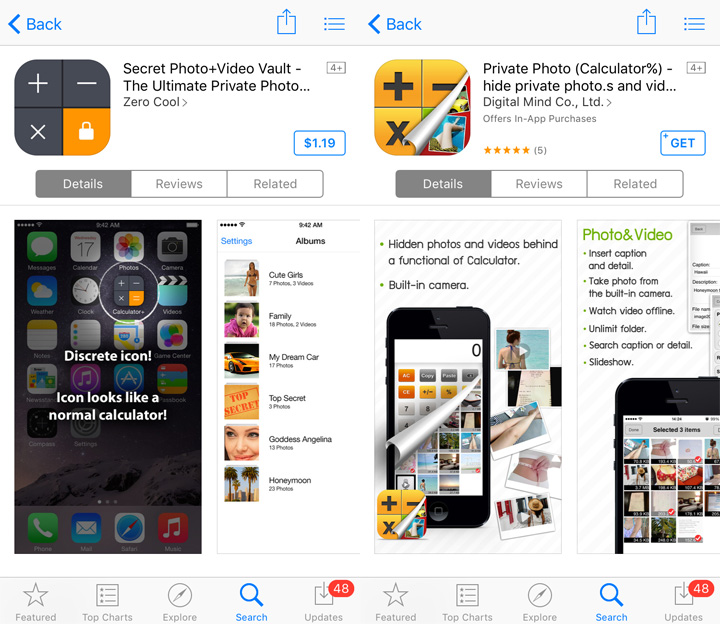A massive sexting scandal involving at least 100 students at a Colorado high school is drawing attention to apps that allow kids to hide sensitive content in plain sight on their smartphones.

The students were allegedly using so-called “ghost apps” – apps that are disguised as harmless applications, like calculators, but turn into a secret photo vault – to store and trade nude photos of their peers, some as young as 13.
Those involved have since been suspended, but Fremont County District Attorney Tom LeDoux said some students could face child pornography charges that cause them to register as sex offenders.
What exactly are these ‘ghost apps’?
A search for “photo vault” apps on both Apple’s App Store and Google’s Play Store reveals dozens of listings for these types of apps.
The majority of them are disguised as simple calculator apps; however, once they are opened, users can type in a passcode that reveals a private stash of photos and videos.
Many of the apps boast “discreet icons” in their app store descriptions – some are even designed to look like Apple’s built-in calculator app.
- What is a halal mortgage? How interest-free home financing works in Canada
- Capital gains changes are ‘really fair,’ Freeland says, as doctors cry foul
- Ontario doctors offer solutions to help address shortage of family physicians
- Starbucks looks likely to win U.S. Supreme Court case involving pro-union workers
But these apps aren’t new and they are extremely popular with smartphone users. One named “Private Photo Vault” is the 28th most downloaded photo and video app in the App Store, with over 1,500 user reviews.
So what can parents do about these types of apps?
Experts urge parents to be upfront with their children about any type of surveillance they plan to do on their child’s device.
Matthew Johnson, director of education with Canadian non-for-profit MediaSmarts, said parents should avoid going through their child’s device without permission, because it can ruin the trust between parent and child.
“No matter what, tech can’t replace conversation. Kids are always going to be ahead of us – that’s why it’s so important that rather than trying to chase the latest app, we have an ongoing open conversation with them so that we make clear to them what our expectations of them are,” Johnson said.
“Make it clear that they can come to you when things go wrong.”
READ MORE: Online safety tips every parent should consider
Instead, Johnson recommended that parents use a family app store account that notifies them when their child downloads a new app and explain to them why they want to know what they are downloading.
But the digital literacy expert said cases like this one are key examples of why parents should start talking to their kids about online privacy at a young age.
“One of the most important things is helping kids understand that things that go on the Internet or are shared via smartphones can last forever and be shared with unexpected audiences,” he said.
“We need to talk to kids from very early on about the idea of consent, because the harm that’s done from sexts really comes from when those images are shared without consent.”
According to MediaSmarts research, sexts are commonly forwarded and reach a fairly wide audience once they are. Twenty-six per cent of students in Grade 8 said a sext they sent was forwarded to other people by the recipient.
MediaSmarts has resources for parents on how to talk to kids about sexting and consent on their website.






Comments